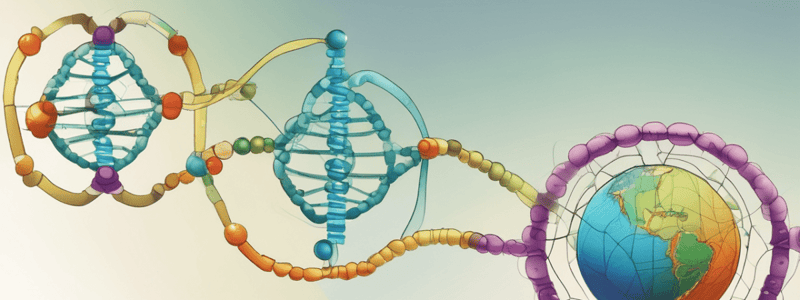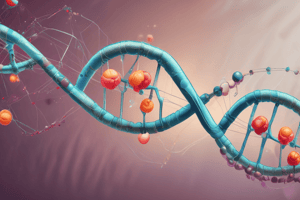Podcast
Questions and Answers
What is the primary function of the DNA molecule?
What is the primary function of the DNA molecule?
- To synthesize proteins
- To regulate cell division
- To carry genetic information (correct)
- To provide structural support to the cell
What are the four types of nucleotide subunits that make up the DNA molecule?
What are the four types of nucleotide subunits that make up the DNA molecule?
- Adenine, Guanine, Thymine, Nitrogen
- Adenine, Cytosine, Guanine, Helium
- Adenine, Cytosine, Thymine, Oxygen
- Adenine, Cytosine, Guanine, Thymine (correct)
What is the structure of the DNA molecule?
What is the structure of the DNA molecule?
- A double-stranded helix (correct)
- A linear molecule
- A single-stranded helix
- A triple-stranded helix
What are chromosomes composed of?
What are chromosomes composed of?
What is the process by which the DNA molecule is copied?
What is the process by which the DNA molecule is copied?
What is the process by which cells divide to produce two daughter cells?
What is the process by which cells divide to produce two daughter cells?
What is the fundamental unit of heredity in an organism?
What is the fundamental unit of heredity in an organism?
During DNA replication, what is the role of the original DNA strands?
During DNA replication, what is the role of the original DNA strands?
What is the primary difference between mitosis and meiosis?
What is the primary difference between mitosis and meiosis?
What is the role of chromosomes in cell division?
What is the role of chromosomes in cell division?
What is the result of DNA replication?
What is the result of DNA replication?
What is the basic structure of a chromosome?
What is the basic structure of a chromosome?
Flashcards are hidden until you start studying
Study Notes
Genetics: Understanding the Building Blocks of Life
Genetics, the study of heredity and the variation of inherited traits, is a central component of biology. It involves understanding the molecular basis of traits, how they are passed on from one generation to the next, and how mutations can occur. In this article, we will explore the key concepts in genetics, including the DNA molecule, nucleotides, chromosomes, and genes, as well as DNA replication and cell division.
The DNA Molecule
The DNA molecule is the primary carrier of genetic information. It is a long, double-stranded molecule composed of four types of nucleotide subunits: adenine (A), cytosine (C), guanine (G), and thymine (T). The DNA molecule is structured as a double helix, with the two complementary strands held together by hydrogen bonds between the base portions of the nucleotides.
Nucleotides
Nucleotides are the building blocks of DNA. Each nucleotide is composed of a five-carbon sugar (deoxyribose), a phosphate group, and a nitrogen-containing base. The four bases of DNA are A, C, G, and T. The nucleotides are covalently linked together in a chain through the sugars and phosphates, forming a backbone of alternating sugar-phosphate-sugar-phosphate.
Chromosomes vs Genes
Chromosomes are structures within the nucleus of cells that contain DNA. They are composed of two DNA polymers that make up a 3-dimensional (3D) structure called a double helix. Chromosomes are made up of thousands of shorter segments of DNA, called genes. Genes are segments of DNA that contain the instructions for making a particular protein or RNA molecule, which in turn may play a structural or catalytic role in the cell.
DNA Replication
DNA replication is the process by which a cell makes a copy of its DNA in preparation for cell division. During replication, the double-stranded DNA molecule is unwound and separated into two strands. Each strand serves as a template for the synthesis of a new complementary strand, resulting in two identical copies of the DNA molecule.
Cell Division
Cell division is the process by which a cell divides into two identical daughter cells. There are two main types of cell division: mitosis and meiosis. Mitosis results in two genetically identical daughter cells, whereas meiosis produces four genetically unique daughter cells. Both processes involve the segregation of chromosomes, ensuring that each daughter cell receives the correct number of chromosomes.
In summary, genetics involves understanding the structure and function of DNA, the role of nucleotides, the organization of genes and chromosomes, and the processes of DNA replication and cell division. By studying these concepts, we gain insight into how genetic information is passed from one generation to the next and how mutations can occur, ultimately influencing the traits we observe in organisms.
Studying That Suits You
Use AI to generate personalized quizzes and flashcards to suit your learning preferences.




